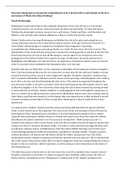How Does Shakespeare present the establishment of love between Hero and Claudio in the first
movement of ‘Much Ado About Nothing’?
Nicole Pinborough
Shakespeare’s plays often feature the continual comparison of two sets of lovers, or two female
romantic heroines, one of whom is dark and small, the other tall and blonde. In ‘Much Ado About
Nothing’ the playwright contrasts romantic hero and heroine, Claudio and Hero, with Benedick and
Beatrice, who provide comic relief in addition to acting as a foil to the primary couple.
Before Claudio enters the stage Shakespeare establishes his role in the play, portraying him as a
‘young’ gentleman who has ‘borne himself beyond the promise of his age’ and earned ‘honour’ in a
recent battle. Animal imagery is employed to emphasise the protagonist’s surprising
accomplishments; Shakespeare presenting Claudio as a ‘lamb’ that has done ‘the feats of a lion.’ This
juxtaposition of the weak with the strong only increases his seeming greatness and due to the fact that
he becomes the focus of Leonato and the Messenger’s conversation, he is introduced as the main
protagonist to the audience before he is present on stage. Furthermore, his youth and naivety is
highlighted, and although in Act One Scene One it is depicted as a limitation which he has overcome in
order to succeed, it also foreshadows his immaturity later on in the play.
Claudio’s first lines in ‘Much Ado’ are his confession to Benedick of his feelings for Leonato’s daughter,
Hero. The fraternal bond between the two characters is made clear for the audience; Claudio is at ease
around his friend and they ‘speak in sober judgement’ together. Benedick’s question, ‘would you buy
her?’ reveals the Elizabethan attitudes towards women and to marriage, objectifying Hero into nothing
more than a product and demythologising the idea of love. This notion is supported throughout the
text, but most notable is Leonato’s assertion of the all powerful patriarchy, allowing the count to ‘take
of [him his] daughter’ in Act Two Scene One, illustrating the lack of choice women had, having to bend
to male authority at all times. Despite Claudio’s re-mythologisation of love through the comparison of
Hero to a ‘jewel’ she is still portrayed as a possession. Elizabethan women were seen as being ruled by
their fathers until they were married, at which point they were passed over to their husband’s control.
A modern audience would object to this concept but in Shakespeare’s time it would not have been
questioned.
In comparison to Claudio’s confessional tone when conversing with Benedick, his speech with Don
Pedro is more formal and, at first, guarded. The count reserves his true feelings in front of the prince,
believing Don Pedro ‘[speaks] this to fetch [him] in’ but still maintains the proper level of respect
required when speaking to nobility. However, Claudio later opens up to the prince when he realises
the influence his power could have over his success in wooing Hero. ‘Hath Leonato any son?’ is
Claudio’s first inquiry of Hero to Don Pedro, as he searches to further increase his place in society after
rising to the Prince’s favourite during the battle. It is only in recent years that marriage has been seen
as primarily a display of love, in Shakespeare’s time the motive behind marriage was to better your
social standing, gaining in wealth and reputation, in addition to starting a family. Claudio is quick to
confirm that Hero is an heiress and will inherit all that her father, the governor, has. Don Pedro
understands entirely Claudio’s intentions and informs him that ‘she’s his only heir.’ Due to the fact that
this is the count’s first question about Hero it could be suggestive of his love being nothing more than a
facade in order to ascertain a better reputation, as well as being a social commentary of the values of
the Elizabethan era.
The shift from prose to blank verse in Act One Scene One, line 264, establishes the romantic tone for
Claudio’s confession to Don Pedro; it renders his speech more rhythmic, which mimics the form of
poetry and has connotations of love. Shakespeare’s employment of war imagery juxtaposes the





